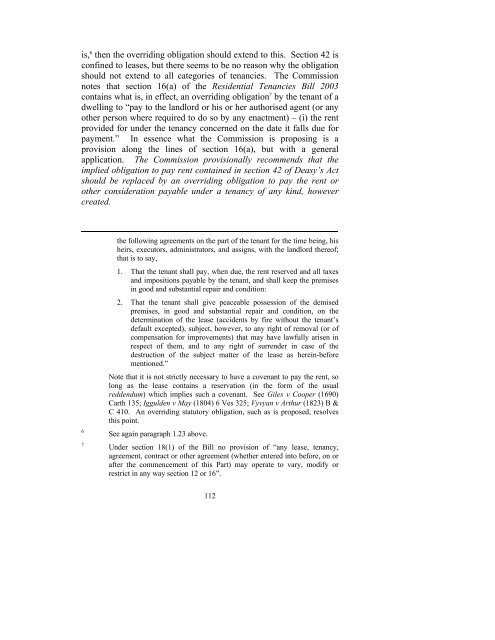Consultation Paper on the General Law of the Landlord and Tenant
Consultation Paper on the General Law of the Landlord and Tenant
Consultation Paper on the General Law of the Landlord and Tenant
You also want an ePaper? Increase the reach of your titles
YUMPU automatically turns print PDFs into web optimized ePapers that Google loves.
is, 6 <strong>the</strong>n <strong>the</strong> overriding obligati<strong>on</strong> should extend to this. Secti<strong>on</strong> 42 isc<strong>on</strong>fined to leases, but <strong>the</strong>re seems to be no reas<strong>on</strong> why <strong>the</strong> obligati<strong>on</strong>should not extend to all categories <strong>of</strong> tenancies. The Commissi<strong>on</strong>notes that secti<strong>on</strong> 16(a) <strong>of</strong> <strong>the</strong> Residential Tenancies Bill 2003c<strong>on</strong>tains what is, in effect, an overriding obligati<strong>on</strong> 7 by <strong>the</strong> tenant <strong>of</strong> adwelling to “pay to <strong>the</strong> l<strong>and</strong>lord or his or her authorised agent (or anyo<strong>the</strong>r pers<strong>on</strong> where required to do so by any enactment) – (i) <strong>the</strong> rentprovided for under <strong>the</strong> tenancy c<strong>on</strong>cerned <strong>on</strong> <strong>the</strong> date it falls due forpayment.” In essence what <strong>the</strong> Commissi<strong>on</strong> is proposing is aprovisi<strong>on</strong> al<strong>on</strong>g <strong>the</strong> lines <strong>of</strong> secti<strong>on</strong> 16(a), but with a generalapplicati<strong>on</strong>. The Commissi<strong>on</strong> provisi<strong>on</strong>ally recommends that <strong>the</strong>implied obligati<strong>on</strong> to pay rent c<strong>on</strong>tained in secti<strong>on</strong> 42 <strong>of</strong> Deasy’s Actshould be replaced by an overriding obligati<strong>on</strong> to pay <strong>the</strong> rent oro<strong>the</strong>r c<strong>on</strong>siderati<strong>on</strong> payable under a tenancy <strong>of</strong> any kind, howevercreated.67<strong>the</strong> following agreements <strong>on</strong> <strong>the</strong> part <strong>of</strong> <strong>the</strong> tenant for <strong>the</strong> time being, hisheirs, executors, administrators, <strong>and</strong> assigns, with <strong>the</strong> l<strong>and</strong>lord <strong>the</strong>re<strong>of</strong>;that is to say,1. That <strong>the</strong> tenant shall pay, when due, <strong>the</strong> rent reserved <strong>and</strong> all taxes<strong>and</strong> impositi<strong>on</strong>s payable by <strong>the</strong> tenant, <strong>and</strong> shall keep <strong>the</strong> premisesin good <strong>and</strong> substantial repair <strong>and</strong> c<strong>on</strong>diti<strong>on</strong>:2. That <strong>the</strong> tenant shall give peaceable possessi<strong>on</strong> <strong>of</strong> <strong>the</strong> demisedpremises, in good <strong>and</strong> substantial repair <strong>and</strong> c<strong>on</strong>diti<strong>on</strong>, <strong>on</strong> <strong>the</strong>determinati<strong>on</strong> <strong>of</strong> <strong>the</strong> lease (accidents by fire without <strong>the</strong> tenant’sdefault excepted), subject, however, to any right <strong>of</strong> removal (or <strong>of</strong>compensati<strong>on</strong> for improvements) that may have lawfully arisen inrespect <strong>of</strong> <strong>the</strong>m, <strong>and</strong> to any right <strong>of</strong> surrender in case <strong>of</strong> <strong>the</strong>destructi<strong>on</strong> <strong>of</strong> <strong>the</strong> subject matter <strong>of</strong> <strong>the</strong> lease as herein-beforementi<strong>on</strong>ed.”Note that it is not strictly necessary to have a covenant to pay <strong>the</strong> rent, sol<strong>on</strong>g as <strong>the</strong> lease c<strong>on</strong>tains a reservati<strong>on</strong> (in <strong>the</strong> form <strong>of</strong> <strong>the</strong> usualreddendum) which implies such a covenant. See Giles v Cooper (1690)Carth 135; Iggulden v May (1804) 6 Ves 325; Vyvyan v Arthur (1823) B &C 410. An overriding statutory obligati<strong>on</strong>, such as is proposed, resolvesthis point.See again paragraph 1.23 above.Under secti<strong>on</strong> 18(1) <strong>of</strong> <strong>the</strong> Bill no provisi<strong>on</strong> <strong>of</strong> “any lease, tenancy,agreement, c<strong>on</strong>tract or o<strong>the</strong>r agreement (whe<strong>the</strong>r entered into before, <strong>on</strong> orafter <strong>the</strong> commencement <strong>of</strong> this Part) may operate to vary, modify orrestrict in any way secti<strong>on</strong> 12 or 16”.112
















